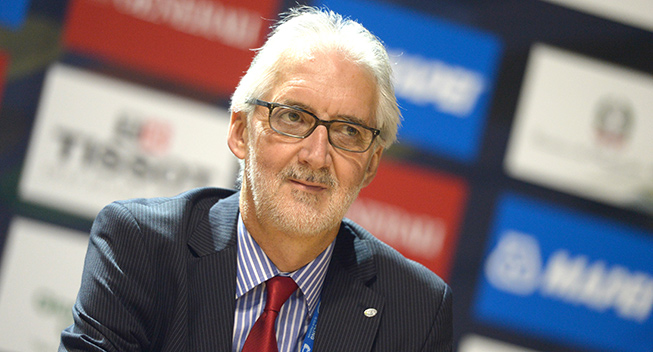UCI President Brian Cookson has undergone lots of criticism due to the fact that he was unable to prevent Astana from receiving a WorldTour license. Now the Brit reveals that he still plans to take action if the Padova investigation produces damning evidence against the Kazakh team.
At the end of the year, Brian Cookson takes stock of the current situation of cycling. Interviewed by La Gazzetta dello Sport, the president of the UCI has clarified his stance on the recent controversy over the licenses of several teams and the Ferrari case. At the top of world cycling for 15 months, the Brit praises one of the novelties of 2015, the International Anti-Doping Tribunal, a body which "consists of 4-5 judges whil will hand out sanction as the first instance in all anti-doping cases committed by riders from WorldTour and Professional Continental teams," mainly to "harmonize penalties internationally and avoid appeals to CAS which remains the court of appeal."
One of the hottest topics at the moment is the Astana case. Cookson has received plenty of criticism for the fact that he was unable to prevent the Kazakh team from getting a WorldTour license.
“I wasn’t able to hide my disappointment on the day of the designation of the WorldTour licences,” Cookson said. “For me, it was very frustrating, but we had to work with legal tools and I had to accept that. But the game isn’t over. I’m still determined to act, professionally and legally, once the dossier from Padova has been received and submitted to the Licence Commission.”
However, Cookson was also quick to support Vincenzo Nibali.
Important words instead for Vincenzo Nibali , team captain, but held off from any scandal note:
"There is no reason to have any suspicion about him," he said. “The problem is that in his Astana team there are people with less desirable histories, and so I’m calling on everyone to take their responsibilities: team managers, national federations, competitors and suppliers."
“The new anti-doping code presents much stronger measures on the ethical side and tells us whether these people can stay working in cycling,” Cookson said, when asked about Alexandre Vinokourov’s position as manager. “By the end of February, we’ll have the recommendations from CIRC, including on having fit and proper persons in charge of teams. But we also have to pay attention to labour laws.”
Cycling today is experiencing a period of economic difficulty and so the goal is to" find new opportunities to make the teams more sustainable from an economic perspective and to continue the investments." One of the features that makes this different from other sports is the easy access. "You do not pay for tickets but the infrastructure is still costly," Cookson said beofre adding that "the television production is expensive as we do not ride in a closed stadium." For this reason, he welcomes projects like the new Velon, an association that brings together 11 WorldTour teams and that supports the economic viability of these teams.
Cookson also spoke about the upcoming reform of professional cycling.
“There’s already a general agreement to limit the number of race days per year for riders and to avoid clashes of dates,” he said. “Everybody says yes, but then everybody stays in their own positions. In this discussion with organisers and teams, it would help if the Giro and Vuelta were more flexible. Cycling isn’t F1. I’m not [Bernie] Ecclestone. Or [FIFA president Sep] Blatter. From 2017, the reforms won’t be implemented as a big bang, but as an evolution.”
Finally, he was asked to comment on the situation of Italian cycling which has suffered for several years due to a lack of funding and doping scandals. "When I was president of the British Federation, we looked to Italy as the biggest cycling country. We even opened an acadamy in Quarrata in Tuscany tp to grow the generation of Cavendish, Swift, Kennaugh.
"Australia did a similar thing. But Italy is now in decline due to the problems of doping and because there was no organization. It seemed that young athletes could only get forward by history or tradition. It is true that we had support from the funds of the National Lottery in Britain but we started from the base. In schools, we did tests of thousands of boys and girls. We have built a network of coaches, a structure."
| Brian LARSEN 48 years | today |
| Elyas AFEWERKI 32 years | today |
| Anders Egsvang RASMUSSEN 29 years | today |
| Naoki MUKAIGAWA 44 years | today |
| Eugenio MIRAFUENTES RESENDEZ 25 years | today |
© CyclingQuotes.com









